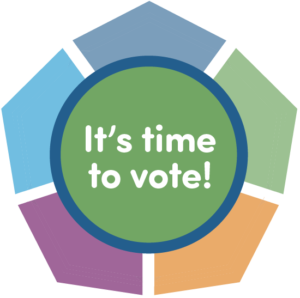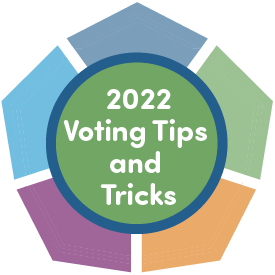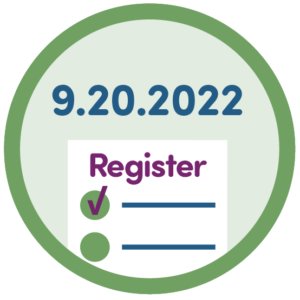2022 Voting Tips and Tricks
It’s General Election Time!
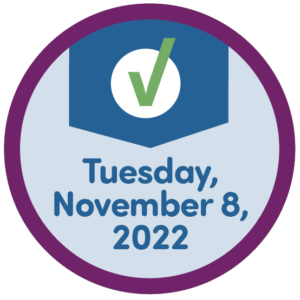
Throughout 2022, Advocacy & Communication Solutions has offered our famous “tips and tricks” to help you gear up for the November General Election. Well, Election Day is almost here! Below we round up the top 5 things you need to do to prepare for November 8.
1. Know Your Rights
- You have the right to vote without intimidation.
- You have the right to cast your ballot without intimidation or coercion, and federal law prohibits any kind of voter intimidation (e.g., disrupting voting lines or blocking polling entrances, following voters around the polling place, or threatening or aggressively questioning voters).
- You have the right to vote, even if poll workers cannot find your name.
If the poll workers cannot find your name in the system, you still have the right to vote by using a provisional ballot. Once Election Day is over, election officials will find out if you are registered to vote and qualified and, if you are, they will count your provisional ballot.
- You have the right to vote if you are in line when the polls close.
If the polls close while you’re still in line, stay in line! You still have the right to vote.
- You have the right to vote if the polling machines stop working.
If the machines are down at your polling place, ask for a paper ballot.
- You have the right to vote if you made a mistake on your ballot.
If you make a mistake on your ballot, ask for a new one.
- You have the right to vote if you don’t speak English or have limited English speaking or reading skills.
Under federal law, polling locations are required to allow for in-person assistance by a person of your choice. In some counties in Alaska, California, Hawaii, Illinois, Massachusetts, Michigan, Nevada, New Jersey, New York, Texas, and Washington, polling locations are required to provide poll workers who speak a specific language and copies of all voting materials in that language.
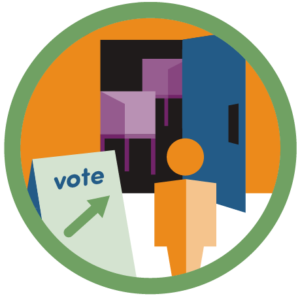
If you have a disability, your right to vote is guaranteed by federal law. According to the American Civil Liberties Union website:
- All polling places for federal elections must be fully accessible to older adults and voters with disabilities. Simply allowing curbside voting is not enough to meet Americans with Disabilities Act (ADA) accessibility requirements.
- In federal elections, every polling place must have at least one voting system that allows voters with disabilities to vote privately and independently. Usually, this is a machine that can read the ballot to you (for people with vision disabilities or dyslexia), and lets you vote by pushing buttons (for people with mobility disabilities).
- Voters with disabilities and voters who have difficulty reading or writing English have the right to receive in-person help at the polls from the person of their choice. This helper cannot be the voter’s employer, an agent of the voter’s employer, or an agent or officer of the voter’s union. The helper must respect the voter’s privacy, not looking at the voter’s ballot unless the voter asks them to do so.
- Election officials (including poll workers) must make reasonable accommodations as needed to help you vote.
- Election officials must provide you with help, if it’s possible for them to do so.
- A voter with a mental disability cannot be turned away from the polls because a poll worker thinks they are not “qualified” to vote.
2. Get Registered
1: Determine your state’s voter registration deadlines—these vary by state, and some states allow for voter registration up until the day of the election.
2: Check your voter registration status. Not registered? Register to vote in your state.
3: Make sure you’re ALLOWED to vote. You can vote in U.S. federal, state, and local elections if you:
- are a U.S. citizen (some areas allow non-citizens to vote in local elections only)
- meet your state’s residency requirements
- are 18 years old on or before Election Day
- are registered to vote by your state’s voter registration deadline
Maybe you’ve registered in the past, but now you’re thinking, “Do I need to re-register or change my voter registration?” According to usa.gov, the answer is:
Yes, if:
You have moved within your state or changed your name.
What you must do: Update your voter registration with your new location or your new name. Make sure you also update your state driver’s license or state ID card before the election, if that is the voter ID you will use.
Yes, if:
You have moved permanently to another state.
What you must do: Register to vote in the new state.
No, if:
Your name and address have not changed, and you are an active voter.
Maybe, if:
You moved to a different state very close to the date of a presidential primary or general election.
What you must do: Check with your old state. You may be able to vote by mail through your old state for that election. After that, you will need to register with and begin voting in your new state.
ACS recommends checking your voter registration status—before your state’s registration deadline—to register to vote. Better safe than sorry.
3. Make an Informed Decision
Being an involved citizen and an informed voter go hand-in-hand; you can’t have one without the other. The best way to be an informed voter is to do your research on your local, state, and federal issues and candidates in advance of Election Day.
Many local League of Women Voters chapters offer unbiased information on levies, constitutional amendments, candidates and more. That’s a good place to start.
These other resources will help you find information that is factual instead of opinionated.
Remember, loyalty to only one news source will not give you the entire—or accurate—picture. Reading a variety of narratives, even those different than your political leanings, can help give you a more well-rounded view on those hot topics everyone seems to be discussing.
4. Make a Plan to Vote
Before you vote, you need to know your state’s rules. Plan ahead for how you’re going to vote
In most states, you have the following options.
Option 1:
Vote early! Most states have early voting, but the exact rules, deadlines, and locations that guide how to vote early vary significantly by the state and/or community in which you live. There are, however, great resources to help you every step of the way so you know all you need to do to ensure your state allows early voting and if that early voting is in person, by mail, both, or something else.
Option 2:
Vote by absentee ballot. Voting by absentee ballot (also called mail-in voting) has made it easier for those with disabilities, those living abroad, even those who are in the hospital, to make their voices heard on Election Day. It’s convenient and eliminates wait time for early or in-person voting. Like most voting laws, different states have different regulations surrounding mail-in voting; learn your state’s laws before you request your absentee ballot. Regardless of what you’ve heard in the media, voting by absentee ballot is a safe and verifiable option for those who need—or want!—to use it.
Option 3:
Vote at your polling place. Traditionalist? Great! If you prefer to vote in person on Election Day, make sure you know where you’re going, as polling locations can change from election to election.
5. Help Friends Get Information
First, forward this newsletter to your friends and family.
Second, share these important phone numbers. The Election Protection Hotline offers voting help in a variety of languages. Don’t let new voting laws prevent you from voting. Know your voter rights before you hit the polls and make your voice heard!
English: 1-866-OUR-VOTE / 1-866-687-8683
Spanish: 1-888-VE-Y-VOTA / 1-888-839-8682
Arabic: 1-844-YALLA-US / 1-844-925-5287
Bengali, Cantonese, Hindi, Urdu, Korean, Mandarin, Tagalog, or Vietnamese: 1-888-274-8683
Want to know more? Review our series of voting tips.
Did you know that you can sign up with your local board of elections as a poll worker for Election Day? Poll working is a necessary role to ensure that each polling location has enough workers to help make for an easy voting experience. You can find out how to be a poll worker in your community, including requirements, hours, pay, training, and more here.
Go Deeper—More Analysis about Voting and Campaign Trends
The ‘Cost’ of Voting in America: A Look at Where It’s Easiest and Hardest
The 2022 edition of the Cost of Voting Index, a nonpartisan academic study, seeks to cut through the politics of voting access. The study ranks all 50 states based on the overall investment a resident must make, in time and resources, to vote.
Once Skeptics, National Democrats Embrace The Georgia Model
In 2018, Stacey Abrams, Georgia’s current Democratic nominee for governor, came extraordinarily close to winning her first campaign for the office. In 2020, her organizing helped Joe Biden narrowly win the state before boosting the fortunes of two Democrats who won both of the state’s Senate seats two months later.
The strategy is now widely accepted on the left—although it is expensive. But Abrams, her fellow Democratic candidates and several voter-focused organizations in Georgia are counting on it again this year.
National Voter Registration Day is Almost Here!
There are some very unique National Days on the calendar—National Old Rock Day, National Answer Your Cat’s Questions Day, National Chocolate Covered Raisins Day—but how much do you know about one of the most important ones: National Voter Registration Day?
On September 20, 2022, volunteers and organizations from all over the country will be helping people register to vote through virtual and in-person registration opportunities. Why? Because every eligible American should take the opportunity to vote and, according to 2020 Census data, 1 in 4 are not registered. That’s millions of people across the country who are not using their vote to make their
voice heard.1 National Voter Registration Day began in 2012 and, since then, nearly 4.7 million voters have registered to vote on the holiday.
Find local and virtual voter registration opportunities or learn how you can host or volunteer at an event here!
Voter Population Registered to Vote
Voting and Voter Registration as a Share of the Voter Population, by Race/Ethnicity:
Total Population, November 2020
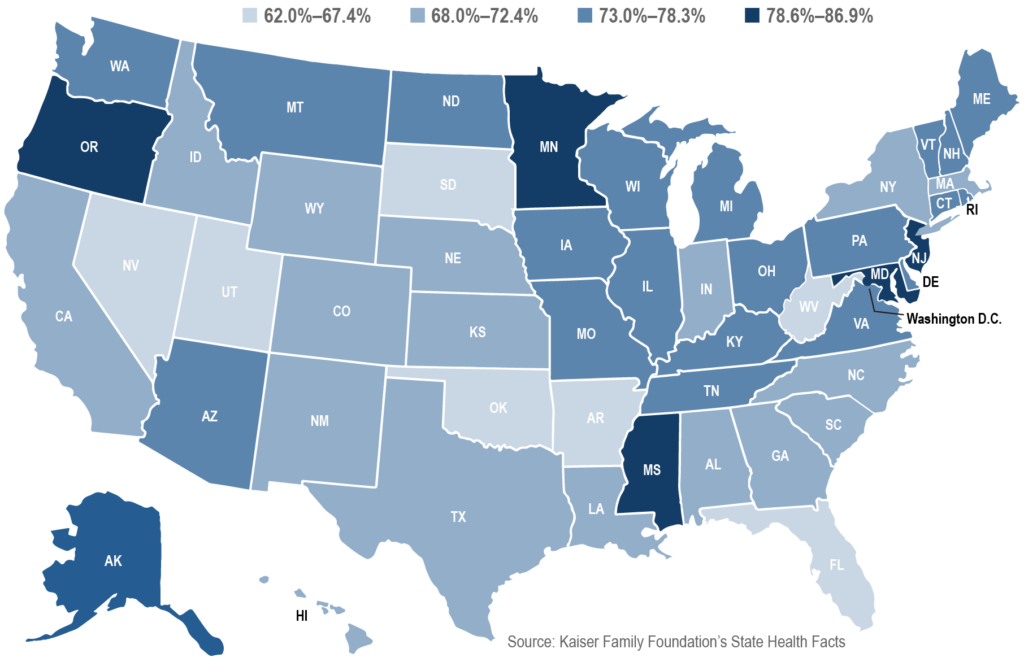
Can’t wait for September 20? Let’s make sure you are registered today!
ACS’ March Voting Tip gave you step by step instructions on how to register to vote. Here’s a summary:
Step 1:
Determine your state’s voter registration deadlines—these vary by state, and some states
allow for voter registration up until the day of the election!2
Step 2:
Check your voter registration status. Not registered? Register to vote in your state.
Step 3:
- Make sure you’re ALLOWED to vote. You can vote in U.S. federal, state, and local elections if you:
- are a U.S. citizen (some areas allow non-citizens to vote in local elections only)
- meet your state’s residency requirements
- are 18 years old on or before Election Day
- are registered to vote by your state’s voter registration deadline
Maybe you’ve registered in the past, but now you’re thinking, “Do I need to re-register or change my voter registration?” According to usa.gov, the answer is:
Yes, if:
- You have moved within your state or changed your name. Update your voter registration with your new location or your new name. Make sure you also update your state driver’s license or state ID card before the election, if that is the voter ID you will use.
- You have moved permanently to another state. Register to vote in the new state.
No, if:
- Your name and address have not changed and you are an active voter.
Maybe, if:
- You move to a different state very close to the date of a presidential primary or general election. Check with your old state. You may be able to vote by mail through your old state for that election. After that, you will need to register with and begin voting in your new state.
ACS still recommends checking your voter registration status—before your state’s registration deadline—to register to vote. Better safe than sorry!
Now that you’ve registered, you can prepare for voting in November’s General Election. Read ACS’s May Voting Tip for more information on how you can be an involved citizen and an informed voter so that you can be in the know before being in the voting booth!
1 According to The Hill, approximately 27% of all Americans aged 18 years or older, numbering 63 million men and women, had not registered to vote in the 2020 election.
2According to ncsl.org, the National Voter Registration Act (NVRA) of 1993 requires that states set their voter registration deadlines for federal elections no more than 30 days before an election. Some states set their deadlines at this 30-day mark, while others permit voters to register up to Election Day and anywhere in between. States may also have different voter registration deadlines for applications completed online, by mail, and in person. Deadlines may also differ based on election type.
What the heck is a special election?
You’ve heard of primary and general elections, but what the heck is a special election? What makes them so special? Does every state have them? And why should you vote in a special election?
Just when you think you’ve got this voting thing down, a special election pops up and makes you question those years of participating in the electoral process. But special elections don’t have to be intimidating. Read below to get the answers to all your special election questions.
What is a special election?
Special elections are elections that can take place any time because there is a vacancy in an elected office. This usually occurs when the person serving in that office resigns, dies, or is removed from office, and a new person must be elected to fill that position. Any person living in the district where this happens is eligible to vote in a special election.
Does every state have special elections?
According to the National Conference of State Legislatures, to fulfill legislative vacancies, only 25 states in the U.S. hold special elections; the other 25 states fill vacancies through an appointment process. The appointment process can vary depending on the position.
In some cases, the appointer is named in statute regardless of political party affiliation of either the appointer or the last person to hold the position.
In other cases, such as a state legislature, the appointment is made by members of the same chamber and party as the incumbent legislator.
For U.S. Senate vacancies, 13 states require a special election to be called. In the other 37 states, the governor makes an appointment to fill the vacancy, and the appointee serves until the next regularly scheduled, statewide general election.
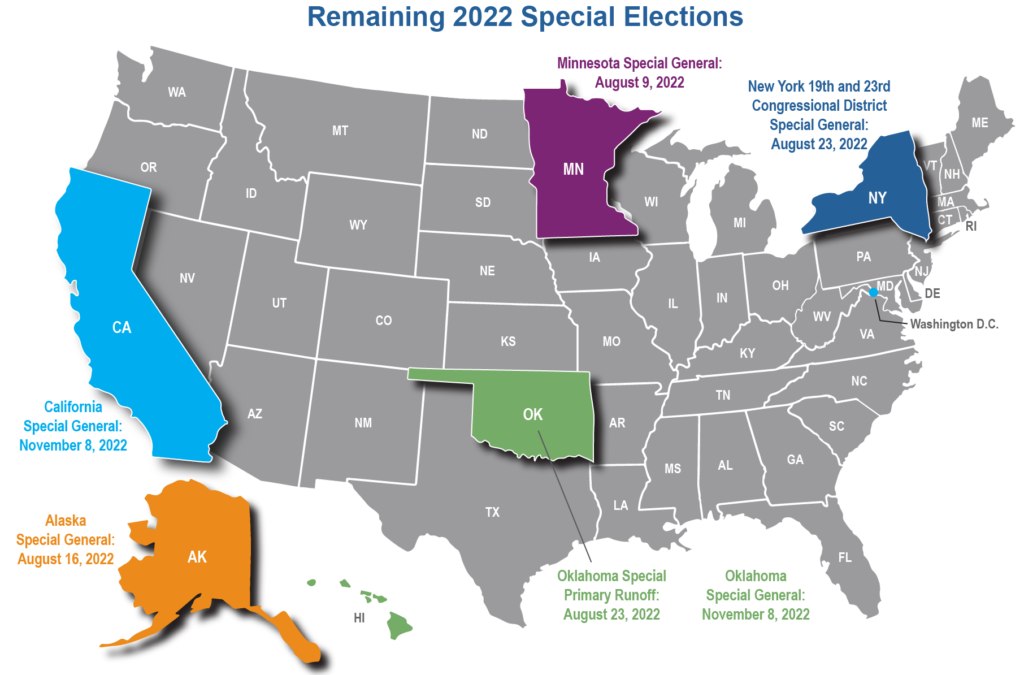
Why should I vote in a special election?
Voter turnout for any election in the U.S. is usually low, but special elections see even lower turnout numbers. Why? Well special elections typically don’t receive much publicity and they usually have very few races—sometimes just one! While special elections may not seem like a big deal because the winner won’t serve a full term, it is still important to vote in one to ensure that the person who takes over the empty seat will make choices that are in line with your political beliefs. And, whoever fills that seat has all the advantages of an incumbent during the next election. The good news is that you can still exercise all your state’s ways to vote during a special election that you do in a primary or general election. See our Advocacy & Communication Solutions’ Spring 2022 Newsletter for more information on how you can vote in your state.
According to FairVote.org, about 60% of the voting eligible population votes during presidential election years, and about 40% votes during midterm elections over the last decade. And according to nationalcivicleague.org, only 15–27% cast a ballot in their local elections.
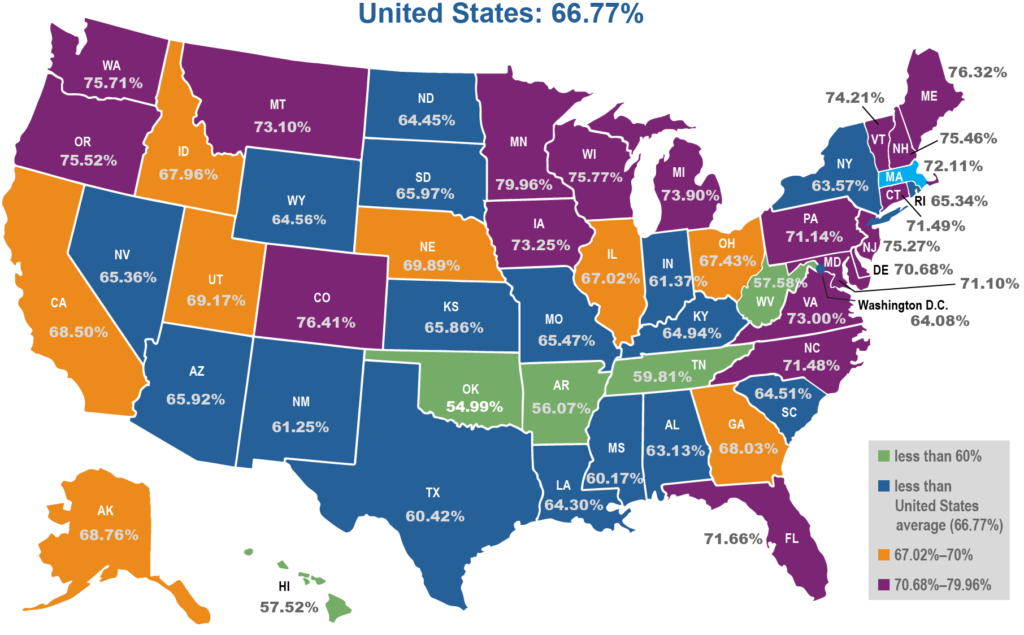
So now you know about special elections and what makes them just so darn special. If your state holds a special election, make sure you take it just as seriously as a primary or general election, and as always, exercise your right to vote and make your voice heard!
Look for more tips and tricks coming up in 2022!
You Gotta Fight…For Your Right…TO VOTE!
We all know that voting can be stressful, but it doesn’t have to be! Knowing your voting rights can help you feel empowered if something goes wrong on election day or with your voting process.
As you read in the Advocacy & Communication Solutions April newsletter, some states have recently enacted various new voting laws and restrictions. Some of these new laws make it more difficult for people to vote. And yes, some of these new laws may impact you. But don’t let those new laws stop you from voting. You just need to know your rights when it comes to casting a ballot in your state to make your voice heard!
You have the right to vote before election day.
In most states, you have two options for voting prior to the actual election, early in-person voting and voting by absentee ballot. Here’s a breakdown of those options by state:
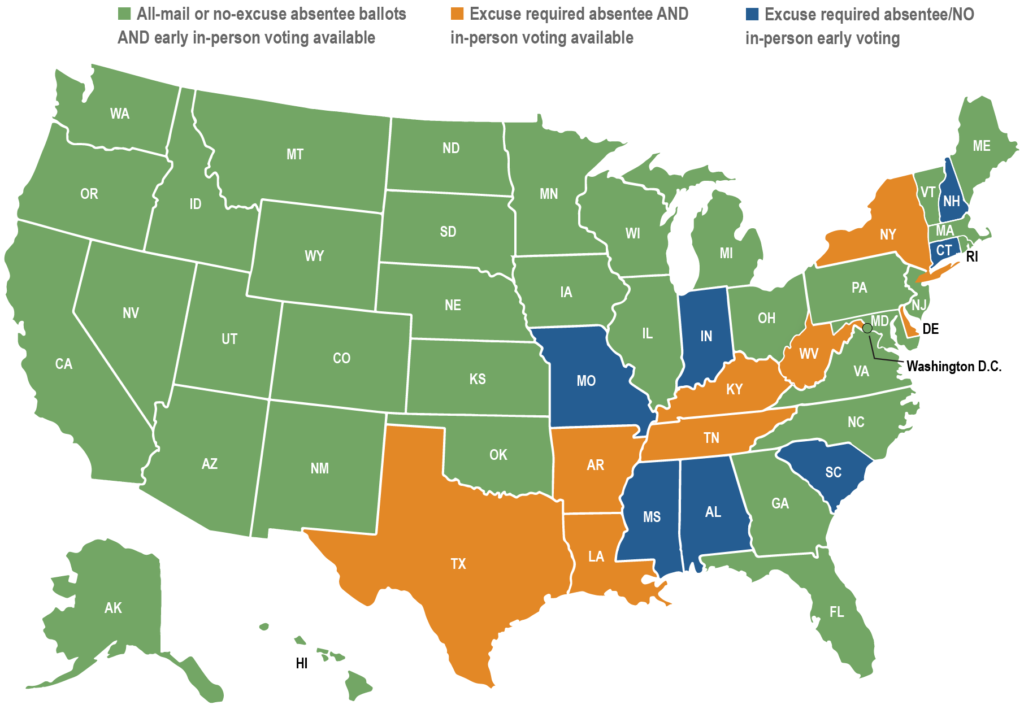
Examples of reasons for absentee voting can include:
- Out of County on Election Day
- Illness or Disability
- Persons Over a Certain Age
- Work Shift is During all Voting Hours
- Student Living Outside of County
- Election Worker or Poll Worker
- Religious Belief or Practice
- ACP* Participant
- Incarcerated (but Still Qualified to Vote)
- Jurors
*ACP stands for Address Confidentiality Program, which protects the information of victims of domestic violence, sexual assault or stalking.
According to the American Civil Liberties Union website, under federal law, you have the right to vote if you have a disability
- All polling places for federal elections must be fully accessible to older adults and voters with disabilities. Simply allowing curbside voting is not enough to meet Americans with Disabilities Act (ADA) accessibility requirements.
- In federal elections, every polling place must have at least one voting system that allows voters with disabilities to vote privately and independently. Usually, this is a machine that can read the ballot to you (for people with vision disabilities or dyslexia), and let you vote by pushing buttons (for people with mobility disabilities).
- Voters with disabilities and voters who have difficulty reading or writing English have the right to receive in-person help at the polls from the person of their choice. This helper cannot be the voter’s employer, an agent of the voter’s employer, or an agent or officer of the voter’s union. The helper must respect the voter’s privacy, not looking at the voter’s ballot unless the voter asks them to do so.
- Election officials (including poll workers) must make reasonable accommodations as needed to help you vote.
- Election officials must provide you with help if it’s possible for them to do so.
- A voter with a mental disability cannot be turned away from the polls because a poll worker thinks they are not ‘qualified’ to vote.
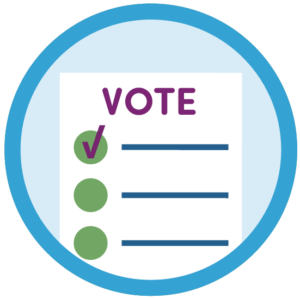
You have the right to vote without intimidation.
You have the right to cast your ballot without intimidation or coercion, and federal law prohibits any kind of voter intimidation (e.g., disrupting voting lines or blocking polling entrances, following voters around the polling place, or threatening or aggressively questioning voters).
You have the right to vote, even if poll workers cannot find your name.
If the poll workers cannot find your name in the system, you still have the right to vote using a provisional ballot. Once election day is over, election officials will find out if you are registered to vote and qualified and, if you are, then they will count your provisional ballot.
You have the right to vote if you are in line when the polls close.
If the polls close while you’re still in line, stay in line! You still have the right to vote.
You have the right to vote if the polling machines stop working.
If the machines are down at your polling place, ask for a paper ballot.
You have the right to vote if you made a mistake on your ballot.
If you make a mistake on your ballot, ask for a new one.
You have the right to vote if you don’t speak English or have limited English speaking or reading skills.
Under federal law, polling locations are required to allow for in-person assistance by a person of your choice. In some counties in Alaska, California, Hawaii, Illinois, Massachusetts, Michigan, Nevada, New Jersey, New York, Texas, and Washington, polling locations are required to provide poll workers who speak a specific language and copies of all voting materials in that language.
Is there something else you have questions on but didn’t find the answer here? The Election Protection Hotline is here to help if you run into any problems or have questions.
English: 1-866-OUR-VOTE / 1-866-687-8683
Spanish: 1-888-VE-Y-VOTA / 1-888-839-8682
Arabic: 1-844-YALLA-US / 1-844-925-5287
For Bengali, Cantonese, Hindi, Urdu, Korean, Mandarin, Tagalog, or Vietnamese: 1-888-274-8683
Don’t let new voting laws prevent you from voting. Know your voter rights before you hit the polls and make your voice heard!
Looking to make an immediate impact in the next election? Volunteer!
In early May, we wrote about how to be a more informed voter, like gathering input from all sides and attending events where a particular candidate will speak or an issue you feel strongly about will be discussed. Now that you know who and what you support, you can go a step further and make a difference within your community and beyond through volunteering wherever, whenever, and however you can!
The best part about volunteering is that you get to choose how much time and what level of involvement works for you. ACS has broken down some volunteer opportunities usually available for any election and identified resources to help you get started based on your interests.
I want to get more people registered to vote.
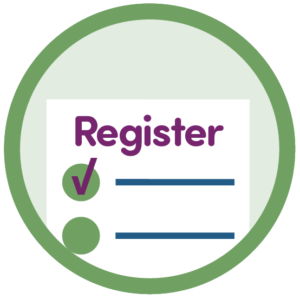
You can be a voter’s first step in casting their ballot. There are many organizations throughout the country that host voter registration drives; local and state chapters of the League of Women Voters hold multiple virtual and in-person drives throughout the year.
Want to do your own drive? Great! In some states, you can host a voter registration party in your community by following these guidelines.
Are you more of a keyboard warrior? You can share information on how to register to vote by following reputable social media sites like VOTE411 or When We All Vote and sharing their posts through your own personal social media channels—on Twitter, Instagram, Facebook, LinkedIn, and YouTube are good places to start.
I want to spread the word on the candidates or issues that are important to me.
Find your candidate’s or issue’s campaign website and contact the individual in charge of volunteers. In most cases, they will provide you with several volunteer options. Many campaigns still conduct door-to-door canvassing, literature distribution, phone banking, yard sign distribution, fundraisers, events and—more recently—text messaging. But there may be more options—call them to find out where they need the help.
Volunteering can be a great way to make your voice heard, but remember that not everyone is going to like you, your message, or your political affiliation, and that’s ok! Also in most cases, you will be working for free (hence the term “volunteering”), so think about what you are and are not willing to do for no pay.

-
Canvassing is a fancy word for knocking on doors and handing out literature to potential voters.
-
Literature Drops, aka “Lit drops,” are the same idea as canvassing except you leave information at voters’ doors, usually in the form of a door hanger or similarly printed piece.
-
Phone Banking can be done either in-person at a call center or alone in the comfort of your home or office. Callers are supplied with a message and a list of phone numbers.
-
Text messaging is the same idea as phone banking except you are texting, not calling, and are usually allowed to complete the task anywhere!
I don’t want to volunteer for a specific candidate or issue.
Constitution Democrat Green Party Libertarian Republican Never fear! Even if you don’t have strong feelings about a candidate or issue, you can still volunteer for your political party, doing a lot of the same volunteer opportunities listed above. Here are links to the volunteer sites for the U.S.’s five largest political parties:
Not affiliated with a political party? Also not a problem. You can sign on with your local board of elections as a poll worker for election day. Poll working is a necessary role to ensure that each polling location has enough workers to help make for an easy voting experience. You can find out how to be a poll worker in your community, including requirements, hours, pay, training, and more here.
I have no time to volunteer, but I still want to make a difference.
Even those with the best intentions may find themselves unable to volunteer. If you want to support an issue or candidate but can’t donate time, consider making a monetary donation. Through personal donations, fundraising, or asking for donations in lieu of a birthday or holiday gift, you can still make an impact on those campaigns or issues you find important. Even small (as small as $1) donations can make a big difference.
Remember, volunteering in any capacity can make a real difference in the world. When you volunteer for an election—whether that be for a candidate, an issue, a political organization, or the local board of elections—you are making a dent in the political landscape of your community, your state, and the nation. The sign of a functional and healthy Democracy is engagement in the process to promote, support, or be a catalyst for change. Everyone has the responsibility to contribute. The people must be the change they want to see, or your community will remain the same. Volunteer! Put in the work to further your candidate or issue! ACS team members have done it and so can you. Now get out and volunteer!
Get involved! How can you be an involved citizen and an informed voter?
Be in the know before being in the booth
Voting is a right, but being informed and involved on issues and candidates is a choice.
As spring primaries bloom throughout the nation, so does the onslaught of media coverage on issues and candidates that may be on your ballot. The best way to ensure that you are prepared with what you need to be ready for election day—now or in the future—is to become an involved citizen and an informed voter.
What does it mean to be an involved citizen and an informed voter?
An involved citizen is one who takes an active role in the planning, decision making, and execution of initiatives that will affect their community, their state, or their country. Being involved can be a huge undertaking (e.g., developing a neighborhood watch program) or a smaller level of participation (e.g., writing a letter to city council in support of a proposed plan). Regardless of exertion, any amount of involvement can be beneficial—for you and the greater community.
I want to be involved and informed…but I don’t know where to begin! Start small!
Passionate about a local issue or candidate? Do some research to determine if getting more involved is something you’d like to pursue. Don’t stop at social media, your newspaper, or your local television station to get your news; gather input from the opposing side, attend events where the candidate will speak or the issue will be discussed, and talk to friends and family about their views on the candidate or issue. Then, if it still speaks to you, reach out to those involved in the campaign. Joining a group that supports an issue you find important or volunteering for a candidate who you feel would make a difference—at the city, state, or national level—is one of the quickest and easiest ways to become an involved citizen. You can volunteer time, funds, or goods to the campaign. You can choose to give as little or as much time as you can. YOU get to decide what level of involvement works for you.
Thomas Jefferson once wrote, “A well-informed electorate is a prerequisite to democracy.” What Jefferson did not know was that in the age of constant information overload along with the ability to spread misinformation far and wide, having informed citizens could literally be the difference between upholding democracy and destroying it. By being an informed citizen, you can better understand the political landscape of your neighborhood, state, and nation, and know the validity of the information you hear, whether that comes from a media source, opposing campaigns or candidates, or your know-it-all neighbor.
Now you know so spread the word
Once you have a firm grasp on who or what you’re supporting and how you will support it, it’s time to encourage others to do the same. This doesn’t have to be done by shoving your beliefs or support down their throats; rather, you can encourage them to become involved and informed, remind them when it’s time to vote, and invite them to remain involved even after the last ballot is counted.
Being an involved citizen and an informed voter go hand-in-hand; you can’t have one without the other. The best way to be an informed voter is to do your research and gather information from a variety of places. Then take that information—those issues or campaigns that speak to youand use them to become an involved citizen. Do both regularly and encourage others to do the same, and you’re well on your way to contributing to the political health of your city, state, and nation’s democracy.
Not sure where to find information that is factual instead of opinionated? Check out these websites that give it to you straight:
www.factcheck.org
www.theconversation.com/us
www.reuters.com
Remember, loyalty to only one news source will not give you the entire—or accurate—picture. Reading a variety of narratives, even those different than your political leanings, can help give you a more well-rounded view on those hot topics everyone seems to be discussing.
